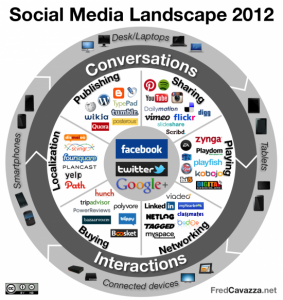Mar 11
22
How Are Social Media Changing Relationships?
Photo credit: FredCavzza.net as shown in http://www.huffingtonpost.com/rana-florida/social-media-brand_b_1452684.html
Social Media Changing Relationships
Social media relationships are impacting our lives in many significant ways. First and foremost, the quantity, diversity, and locations of people with whom we are enabled to connect has expanded dramatically.
An interesting post in the Social Media Examiner described four ways that social media are changing our relationships. Here is an excerpt from that article:
We can connect with the CEO of a Fortune 500 company on LinkedIn. We can meet others who enjoy our love of punk music or we can share recipes for Thursday night’s dinner with people we’ve never met before.
The business case for developing such a broad social network is found in the work of Pierre Bourdieu, a French sociologist, who studied how people have historically gained social currency (he called it social capital). One way they did this was by having large networks that were loosely organized and not particularly intimate. This finding has been supported in many industries, which demonstrates that those who attain top leadership positions tend to have broad social networks.
With this increase in number of connections and frequency of contact, you’ll also see that you have access to many more ideas and resources than ever before. You can crowdsource the best information to solve our particular business issues. Research shows that, generally speaking, more opinions create a better result.
Given the informal nature of social media, it’s easy to approach someone you’d like to meet, and this can be done more easily and fluidly. It’s easier to extend your sphere of influence and enlarge it to include people you’d like to meet, or would like to know better. This means that influence will beget more influence.
Anyone who has been reading my blog knows that my main goal for using social media is to develop strong quality relationships. However, there may also be value in quantity.
The Strength of Weak Ties
However, Sociologist Mark Granovetter, of Stanford University, proposed an influential social network theory called “the strength of weak ties.” The theory explains the surprising value of relatively superficial relationships, such as we often find with social media. In my previous blog post, entitled “Relationships, Collaboration, or Noise,” I explained:
For networking purposes “weak ties” can be more helpful than strong ties, because they connect us to resources and information we would not otherwise know about. Close friends tend to know the same people and things we know. ”Weak” ties, i.e., friends who are less close, are more useful when it comes to searching for new jobs, ideas, experts, and knowledge.
Weak ties require less “maintenance” and therefore are less time consuming. People can keep up with more weak ties without them being a burden. Although nothing can substitute for the intrinsic value of strong relationships, there may also be value in having many “weak” “ones.


